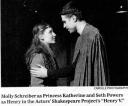From today’s Boston Globe. Molly is Mark and Ginger’s daughter. We’re going to the matinee on February 2nd.

STAGE REVIEW

‘Henry V’ is spare but richly told
By Louise Kennedy
Globe Staff / January 17, 2008
CAMBRIDGE – As it matures, the Actors’ Shakespeare Project is revealing a persistent knack for setting itself tricky challenges and then, usually, meeting them. The latest: staging “Henry V,” with its vast battles and its epic sweep from England to France and back, in a cramped basement – with just five actors.
It works. And how.
Well, how? That is the interesting question. Partly it works because Shakespeare knew that no stage could ever hold all the scenes he conjures here, and so he repeatedly uses the character of the Chorus to remind us that we are watching a play, that the world is far bigger than this wooden platform, and that the actors must therefore implore the audience to “piece out our imperfections with your thoughts.” And so we do – and, paradoxically, the less a production of “Henry V” gives us to look at onstage, the more we see in our mind’s eye.
Director Normi Noel, who has experienced the power of visually spare but linguistically rich stagings at Shakespeare & Company, clearly shares the ASP’s belief in deep simplicity (a belief that may owe something to the size of the company’s budget). She keeps the five actors moving and talking with vigor and without fuss; they shift among wildly different characters not by exaggerated changes of mannerism, voice, or costume, but by giving each one a full, clear, and unimpeded voice. Noel knows what more directors should: If you just stay out of Shakespeare’s way, he does most of the work himself.
That’s not to say the actors here don’t have to work hard. Just take visiting artist Seth Powers, who must shift in a wink from regal Henry to roguish Bardolph, or company member Paula Langton, who’s both a heartbreaking Mistress Quickly and a heart-stirring Fluellen. (And that’s only counting their major roles.) But their work, like Noel’s, focuses on thinking through every aspect of the performance, from the simple logistics of quick changes to the more profound questions of character and tone, rather than on showy delivery or grand gestures. No one here has time to overdo anything, and that pressure gives all the acting a clean, athletic grace.
Powers, a fine New York actor who has worked with Shakespeare & Company but is a newcomer here, embodies both the bluff heroism and the reckless ambition we expect from Henry in this post-heroic, ambition-weary age. Noel has said that she wants her “Henry V” to encompass both the glory and the horror of war, especially now. And Powers does: Though he occasionally overdoes the tremulous note of passion, he’s inspiring, especially in such classic moments as the St. Crispin’s Day exhortation to his troops, but he also conveys Henry’s weariness and imperfection. It’s that kind of nuance that makes this “Henry” a more thought-provoking response to the Iraq war than more heavy-handed attempts have been.
Having Powers double as Bardolph also underscores both the contrasts and the parallels between the low-comic scenes and the high eloquence of the English and French courts. We flash from noble arguments to base quarrels, and we see the human self-interest and needs that underlie both: The royals may sound more virtuous than the rogues, but they’re all just trying to get what they can.
Thus Ken Cheeseman creates an unctuously self-serving Archbishop of Canterbury, an equally focused French King Charles, and a rougher but no less self-absorbed Pistol, king of the commoners. Doug Lockwood, a highborn minion as the Bishop of Ely and a sweet loser of a sidekick as Nym, nicely completes the knavish trio. Molly Schreiber gets fewer chances to shine in smaller roles (the Earl of Cambridge et al.), but her Katherine is both sweet and sly, a worthy target of rough Henry’s wooing. And all the actors, in turn, give evocative voice to the vivid scene-painting and driven poetry of the Chorus.
The design team deepens the story with small but telling details. A seagull’s cry or a martial drum from sound designer Dewey Dellay carries us to Southampton or Agincourt; Steven Rosen’s crackly orange light gives Henry’s soldiers a campfire on Skip Curtiss’s otherwise bare, planked stage – a “wooden O,” just as specified. And, best of all, Seth Bodie’s costumes transform king to commoner, herald to princess, with nothing more than a scattering of sashes, caps, cloaks, and capes in meticulously chosen fabrics: the English in red, the French in blue, and the whole wide world springing forth between.









